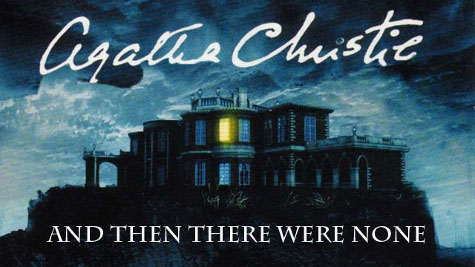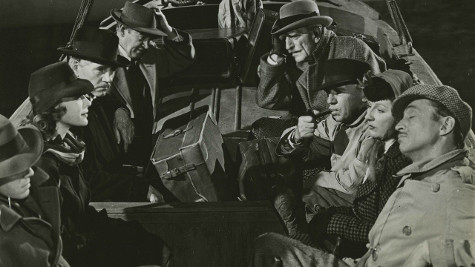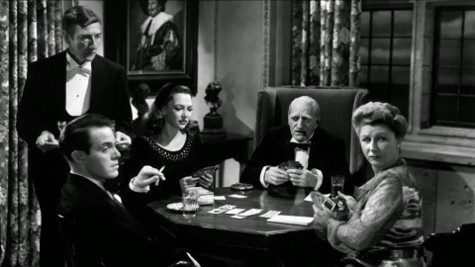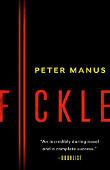
When my son was little, he wouldn't read. There were too many other exciting ways to absorb stories—including the endless escapades he would make up himself—so what was magical about reading? He rejected TV on the same basis, so points for the kid there. But, being as his mother was a big reader and Dad stayed up nights writing novels, we kind of wanted him in the club.
We tried a couple of popular kiddie series, all assured to be addictive. Nothing grabbed him. One day, I discovered my son sitting silently, studying the suspect cards of the board game Clue. That night, I started reading Agatha Christie's And Then There Were None to him. I had a couple of moments of doubt. I mean, aside from the regularity of the killings, there's that revelation near the end that's kind of brutal…. But I went ahead, and he loved every non-explicit grisly bit of it. Since then, it's been a murder mystery life.
I've often wondered why so many of us, generation after generation, love that mystery novel first published in 1939. This makes it old—for point of reference it was originally dubbed Ten Little Niggers, a title then considered acceptable in its native England. So why the top-of-the-charts durability from all the way back then until now?
Well, the story is certainly tightly constructed and masterfully executed. Ten strangers lured to an isolated setting are accused of various murders and come to realize that their unseen host aims to execute them one by one. The telling is spare—there are no extraneous scenes, characters, or clues. As such, the reader gets yanked deep into the tale from the start, with no letup through the entire reading experience.

That said, like the characters, the reader becomes increasingly aware of the scaffolding. As Christie's secluded weekend guests discern with creeping certainty the deadly nature of the predicament they're in, likewise, the reader creeps toward full appreciation of Christie's creative brilliance in rolling out her serial killer's scheme, motive, and personality even as she maintains her grand secret: the ringmaster's identity.
All good stuff, of course, but why wouldn't at least some of it be subject to the sort of accusations that have been leveled at so many of Christie's other constructs: the set-up sterile and contrived, the victims and suspects two-dimensional straw men maneuvered like chess pieces, the story concerned only about its clever twists and nothing about the organic evolution of character or plot? Somehow, the qualities that have subjected Christie's work to some level of scorn among literary critics do not dent the artistry and effectiveness of this star among whodunits.
I've reflected on this over the years, and recently, while preparing for a symposium at which I'll talk about the role of law in noir (my second novel, Five Dead Guys and a Girl, is about to come out, making me a crime fiction “expert” invited to “speaking engagements”), I got in touch with the feature of Christie's most riveting novel that I believe has earned it the mystery-reading community's undying respect. To me, it's the underlying thesis about the strange inequities of law and punishment that provides the depth, texture, and provocation that imbue And Then There Were None with the sophistication of a classic.
Okay, crime ficiton fans: ** spoilers below! ** Everything discussed in this essay to this point is revealed in the opening scenes of And Then There Were None, and thus is more in the nature of the novel's premise than its reveals. Below, however, are some details you do NOT want to know before you have read or at least viewed the 1945 film version of Christie's masterpiece.
This “law's inadequacies inspire revenge” thesis is, in some ways, both obvious and nothing new. After all, the novel's scheme is laid out early and openly: some unknown purveyor of penalties believes each of the persons collected for the weekend to have escaped capital punishment and that these miscarriages of justice warrant correcting. It's a lesson in which crime fiction readers are well versed.
And as far as the originality of a moral study about the wrongness of righting wrongs with more wrongs, vigilantism as a motivator has been a standard of stories both highbrow and pulp since The Count of Monte Cristo met Batman met The Bride Wore Black. So it isn't the broad parameters of Christie's “punishing the baddies who slipped the noose” theme that renders And Then There Were None uniquely awesome.
Nor is it the collection of supposed killers or the killings themselves that elevate And Then There Were None above its rivals. At first glance, in fact, it appears that Christie has corralled a fairly standard version of her usual cast of English country house suspects for a weekend of iced cocktails and warm corpses.
There are the stuffy upper-crusters: a hanging judge, a Harley Street doctor, a slick young swell, and an ex-General. Down a notch, class-wise, are the pedigreed spinster, the games mistress, and the freelance mercenary. Working class members of the party include an ex-cop along with the butler and housekeeper. It's practically Clue, the slightly expanded version. As far as their supposed crimes, these include carefree driving and careless nannying, withholding meds and nipping before operating, giving false testimony and convicting the innocent, and a couple of theater-of-war blunders. Without more, the characters and their assorted sins are not all that transformative.
But it is, in fact, the murky collective of “crimes” and the various rationalizations and reactions to them among the seeming law-abiding party that pokes hard at our sense of moral conviction. If we take the perspective of the unknown host-cum-assassin and accept the various accusations as accurate (there is a question or two about whether the accuser got the story of each hidden murder completely right, and even Christie changed key details of several characters' murder resumes when she wrote the play version), the transgressions fall into three basic categories presented below in order of their increasingly troubling attributes.
Cheaters in the Game of Law

First, and possibly the most easily accepted as worthy of a murder accusation, are the characters that subverted the legal system itself to commit their sins. These would be the several who gave false testimony or otherwise undermined a criminal proceeding to encourage a guilty verdict, which led in each case to a legally-sanctioned death.
It's easy to accept as criminal such overt perversion of the system through which we humans deem one another worthy or unworthy of living out a natural life. Who among us is not gravely troubled at the idea of posthumous exonerations and wrongly convicted persons languishing in prison? Those who purposely subvert an admittedly imperfect but gravely consequential system as the justice system are easily justified as guilty for the suffering they inflict. This is an interesting category of vigilante victim for Christie's secret killer, for sure, but perhaps not the most profoundly troubling.
Licensed to Kill
A second group of supposed capital offenders Christie gathers for her weekend slaughter-fest are those who purposely or recklessly breached a professional duty, resulting in the death of one or more innocents. Christie casts her net broadly here so as to encompass a diverse assortment of this brand of miscreant. A doctor who operates while under the influence, soldiers who put personal animosities or self-preservation above duty, a driver who flouts the rules of the road—all are recognized and feared by the population at large.
Who doesn't harbor doubts about the competence of surgeons when about to go under anesthesia? Who hasn't pondered the question of how many wartime casualties result from a subhuman viciousness released in the jungle of combat? Who doesn't wonder, fleetingly, every time we buckle up if it's our turn to encounter a criminally aggressive driver?
Regardless of our fears, however, we load up our condemnation of such licensed rule-breakers with skittish caveats. After all, is not alcoholism a disease rather than a crime? Can those of us who have never experienced the hell of war in fairness revile the temporary insanity of those who have? Don't we all remember driving carelessly when we were young, stupid, and immortal? So this group—although we readers certainly get the vigilante's motive for putting such mortal dangers out of commission—also stirs some doubt and even empathy. They are bad actors, but is death-for-a-death the appropriate sentence?
There But For the Grace of God
The group into which the remaining of Christie's ten accused fit is the most troubling of all. These are the four accused of wrongs that are never quite explained as crimes or even potentially criminal as defined by law.
Does a non-medically trained domestic commit murder when he or she neglects to medicate a dying employer? Does a child's hired caregiver commit murder by allowing herself to be distracted while the child puts himself in danger? To avoid committing murder, must a homeowner allow a person she considers morally depraved to remain living under her roof?
It is these so-called crimes—crimes which Christie, incidentally, presents as distinct from one another insofar as their levels of culpability—that may haunt readers of And Then There Were None more than anything else about the tale. The motives of these evildoers were, in all cases, emotion-based: impatience to inherit, romantic yearning, moral conviction.
The motives are also disturbingly familiar: who among us has never dreamt up evil scenarios when faced with the oh-so-sweet-and-just-out-of-reach prospect of love or money? Who among us has never only just managed to hold in check an outburst of righteous indignation? And, culling another example from one of Christie's houseguests covered above in my second group, who among us knows we would never lash out with deadly intent upon discovering that our sainted spouse has been cheating on us with our closest friend?
We who admit to such almost-sins—are we almost-killers? Could we have earned ourselves a weekend of death-row caliber fear, the horror of knowing that we are stalked by a pitiless executioner? Do we belong on Christie's island?
Law: the Measure of Evil?

What part should the law play in the condemnation of these ten supposed killers? Christie's characters, most of whom are given long enough to fully cogitate on the nature of their past actions as well as the likelihood of their own deaths, avoid confronting their sins for the first days of their predicament, instead focusing on the madness of their unknown executioner. Most, however, eventually come around to considering their culpability for their past actions and its moral connection with their impending doom.
But is every avoidable death, every death precipitated by some unfortunate or reprehensible act, worthy of the ultimate penalty? Clearly not. And if the law itself—that venerated, ponderous, oppressive system of justice we've nurtured to behemoth proportions through the centuries—has deemed a person unworthy of capital punishment for whatever reason, be it pardon, error, or simple oversight, isn't that proof enough that the person's errors, even those that result in a death, are not egregious enough to constitute murder, much less earn the culprit an early death?
These questions seem worthy of contemplation in Christie's telling. We readers actually feel for the killers, especially those whose errors Christie's unknown vigilante deems the most reprehensible, as they are subjected to psychological terror far more torturous than the supposed lesser killers, who are dispatched early, in part as a means of tormenting those who remain.
That is the key to why I think that Christie's And Then There Were None is, for many of us, one of the all-around greatest murder mysteries ever written. It isn't the fine clockwork precision of the plot and structure. It isn't the shivery escapism of the microcosm-of-life cast and lonely English manor setting. Nor is it the suspense associated with the deaths, which take on an almost numbing, inevitable quality as the reader (and the characters) comes to accept the masterful nature of their punisher's plan and tactics. It is the way Christie subtly inveigles her readers into relating to her cast of killers, each with his or her fatal mistake, and thus also into sharing their ambivalence—horror tinged with acquiescence—over their plight.
In her masterpiece, Christie stirs up questions about the criminality of the death penalty and human society's reliance on a flawed legal system to sort the depraved from the merely cruel, the societally dangerous from the merely selfish, the irredeemable from the merely careless or greedy or righteous. I revisit the book from time to time, in part because I'm a crime fiction writer who marvels at the timeless beauty of Christie's construct. But another part of me needs to re-experience the cautionary tale of And Then There Were None. My conscience whispers to me that some of those unlucky weekend guests, with their very human flaws that for one moment flared into very human crimes, could be me.
Comment below for a chance to win a copy of Fickle by Peter Manus!
To enter, make sure you're a registered member of the site and simply leave a comment below.
TIP: Since only comments from registered users will be tabulated, if your user name appears in red above your comment—STOP—go log in, then try commenting again. If your user name appears in black above your comment, You’re In!
 Fickle Comment Sweepstakes: NO PURCHASE NECESSARY TO ENTER OR WIN. A purchase does not improve your chances of winning. Sweepstakes open to legal residents of 50 United States, D.C., and Canada (excluding Quebec), who are 18 years or older as of the date of entry. To enter, complete the “Post a Comment” entry at https://www.criminalelement.com/blogs/2017/01/what-makes-agatha-christies-and-then-there-were-none-everyones-favorite-murder-spree beginning at 3:00 p.m. Eastern Time (ET) January 20, 2017. Sweepstakes ends 2:59 p.m. ET January 31, 2017. Void outside the United States and Canada and where prohibited by law. Please see full details and official rules here. Sponsor: Macmillan, 175 Fifth Ave., New York, NY 10010.
Fickle Comment Sweepstakes: NO PURCHASE NECESSARY TO ENTER OR WIN. A purchase does not improve your chances of winning. Sweepstakes open to legal residents of 50 United States, D.C., and Canada (excluding Quebec), who are 18 years or older as of the date of entry. To enter, complete the “Post a Comment” entry at https://www.criminalelement.com/blogs/2017/01/what-makes-agatha-christies-and-then-there-were-none-everyones-favorite-murder-spree beginning at 3:00 p.m. Eastern Time (ET) January 20, 2017. Sweepstakes ends 2:59 p.m. ET January 31, 2017. Void outside the United States and Canada and where prohibited by law. Please see full details and official rules here. Sponsor: Macmillan, 175 Fifth Ave., New York, NY 10010.
Read Debbie Meldrum's review of Fickle!
To learn more or order a copy, visit:
Peter Manus's novels, Fickle and Five Dead Guys and a Girl, are available from DIVERSION BOOKS.

Interesting piece by Mr. Manus!
I am fickle, but I’ll give Manus a try.
Interesting examination. I need to reread it!
Love the Rene Clair movie. Love, love, love it.
Damn…first read And Then There Were None at about the age of 10 and reread it in college. Probably been 40 years since I last read it. Guess I’m gonna have to dig up a copy….
When I met Jeff Lindsay (DEXTER author) I asked him…’I want to write a crime novel. Who should I read?’ One author he named was Agatha Christie. I’ve never read AND THEN THERE WERE NONE. I guess it’s time to do so. I enjoyed this post as I am a crime enthusiast. I would love to read, FICKLE. Thanks.
Great article! Put me in for ‘Fickle’
Very interesting article by Mr. Manus. I have been
a life-long Christie fan. Have read and re-read the Christie novels many times….. time for another cycle through. Would enjoy reading “Fickle” too.
Fascinating – thank you for some new insights.
toss me in.. I enjoy Christie!
interesting
Sounds like a great read!
Sounds like a great read!
I suspect Christie novels are better films than the written word….or so it seems to be when I re-read some of her mysteries…Maybe I’m just spoiled when the film takes so much of the imagination away. I am amazed at how different the film portrayals are of the various Miss Marples…but I love them all. I look forward to your book.
Film noir, my favorite. A book is even better!
Film noir, my favorite. A book is even better!
I remember reading Agatha Christie as a tween from library books. John MacDonald and Agatha Christie were my escape books.
Greta Article. love the Agatha Christie Mysteries.
Enjoyed this wonderful post. Many thanks.
Agatha Christie invented the “gather all the suspects together” genre. In “And Then There Were None”–they’re completely isolated, totally helplessly, vulnerable, and ready to be killed. So instead of gathering everyone together at the end, she, in this one, brilliantly gathers them altogether right at the beginning.
I read Agatha Christie when I was much younger. I enjoyed her book, although reading them all at one time did cause me to think some of them repeticious. The same memes were used constantly. I have enjoyed most of the films based on And Then There Were None, including the one recently broadcast which followed the book closer than most.
Anxious to try reading a novel in this format, please count me in!
Huge Christie fan here and a fun Manus article. Fickle sounds like a book to put on my list too! Thanks for the chance.
I have long wanted to read Agatha Christie! Fickle sounds intriguing. Thanks for the chance to win!
Last of the Ten! Yes!
Every time there is a TV version of Christie’s And Then There None, I have to watch it as the story varies for director. Sadly, I have never read the original book. But I have read Miss Marple.
Every time there is a TV version of Christie’s And Then There None, I have to watch it as the story varies for director. Sadly, I have never read the original book. But I have read Miss Marple.
I try not to miss any of Agatha’s movies. Seen most of them many times.
I’m all in with Mr. Manus’ son. Christie is the master.
Would love to try FICKLE!
Very interesting. I’ve always meant to read it but never got around to it. Maybe this year.
sounds like a fun one
The book sounds like one I would enjoy reading. Mysteries are my favorite genre.
I am intrigued!
I have never read Agatha Christie and so Peter Manus’s review of her stellar “And Then There Were None” is fascinating. Can’t wait to read his debut “Fickle”.
[b]The book sounds like one I would enjoy reading.[/b]
Okay just reading this makes me want to go find our game of “Clue” and see if I can get some of my co-workers to play at lunch
Good post.
I greatly appreciate studies of the ‘mechanics’ of novels. This sort of in depth research is what I could read all the time. Regrettably, there don’t seem to be enough of such assessments as Mr. Manus gives us here. Looking at such stories through the lens of many facets makes my day, and gives reading such depths as I never knew before. Bravo!
Extremely interesting and entertaining words up above. Much anticipating Peter Manus’s debut! 🙂
My favorite Christie novel as well. I disagree with Mr. Manus’s assertions of why this the best of her work though, I think it has more to do with the fact that you know so many more murders are coming but not the who, when , where or why.
Agatha Chrisite’s books are great.
Would love to win “Fickle” too.
It sounds like a very interesting book to read.
I love Agatha Christie! There are some amazing versions of And Then There Were None. The original is the best. Thanks for the great article
I was quite young when I read And Then There Were None, and these are the books that stay with us forever, and make us recommend them to others. Wish me luck!
this book sounds great thanks
Willing to give this a try!
Thought provoking! Agatha Christie was my first ‘adult’ mystery writer love. It is interesting to see how after all these years she still inspires writers to her works for analysis.
Thought provoking! Agatha Christie was my first ‘adult’ mystery writer love. It is interesting to see how after all these years she still inspires writers to her works for analysis.
Haven’t read this Agatha Christie will have to read it soon
I would like to read this.
Sounds like a fun mystery!
Agatha Christie was my mother’s favorite author and her love of mysteries led me to my own love of the genre. Reading is a wonderful habit to instill in anyone. I’m looking forward to reading your book.
Amazing that such a classic can still be enjoyed and appreciated nearly 80 years later! Thank you for such a thoughtful review – well done!